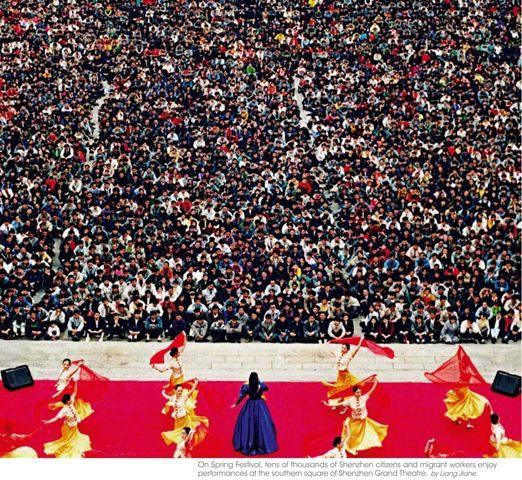Red Envelopes for the World
2013-04-29byWenXi
by Wen Xi

For Chinese children, the best part of Lunar New Years Eve is receiving red envelopes of lucky money from elders, rich and poor. During the festival – the biggest holiday of the year – adults enjoy family reunions, visit friends and relatives, shop for new clothes, stroll through temple fairs, and eat big meals.
Similar to Christmas, such a festive occasion creates tremendous opportunities for businesses in almost every sector, particularly culture, transportation, tourism, telecommunications, and dining, and the comprehensive seasonal stimulus characterizes the Spring Festival economy.
In 2012, for example, passenger volume during Spring Festival reached 3.137 billion trips, and in 2013 it is expected to top 3.4 billion – more than twice total population of China. When it comes to tourism, during the seven-day holiday last year, Beijing welcomed 8.27 million visitors who injected a total of 3.4 billion yuan into its local economy.
The bump in total retail sales in December and January is huge, before plummeting in February.
Over the last few years, as China has seen rapid economic development, impact of the thriving Spring Festival economy has rippled across the planet.
During 2012 Spring Festival, for instance, Vancouver, Canada, hosted a Chinese temple fair with brightly-colored signs and lanterns accented by boisterous beating of drums and gongs. Virtually every local Chinese community and group participated in the celebration, injecting unprecedented Eastern flavor into the Western coastal city. The festival also heated up Vancouvers winter economy, and words such as “hot”and “noisy” were frequently seen in local media reports.
Thailands biggest traditional holiday can trace its roots back to China and falls at the same time of the year. The increasing flow of tourists from China inspired the Thai tourism industry to merge native celebrations with Chinese New Year in an attempt to attract even more Chinese holiday visitors.
Chinese immigrants have brought Spring Festival elements to every corner of the world. Icons of festive Chinese culture, such as knots, floats, child-faced over-sized masks, stilt walking, and dragon dances, bring delight across cultural boundaries. Travel agencies and major international shopping destinations were overjoyed last year to see greater numbers of Chinese tourists contributing to local economies as part of their celebration at the dawn of Year of the Dragon.
According to media reports and authoritative analysis, during last Spring Festival, Chinese visitors contributed to a 10-percent jump in retail sales in Japan and injected 4 billion THB (approximately US$133 million) into Thailand. Lotte Department Store in Seoul, South Korea, saw its Chinese customer flow triple over the previous year. Chinese visitors to Shilla Duty Free Shop jumped 273 percent. And the flow of Chinese consumers to Europe during Spring Festival increased 15 percent, despite rising travel costs.
During the two months around Spring Festival, both imports and exports from bonded warehouses skyrocket due to heavy tourist flow, bringing a drastic increase in sales of commodities in duty-free zones. Trade between China and popular holiday destinations, such as South Korea, Thailand, and Maldives, is extremely busy during this season.
China is the worlds largest exporter: It accounted for 10.4 percent of global exports in 2011. It is also the worlds second largest importer, accounting for 9.5 percent of the global total the same year. When Chinese people around the world, including businesspeople, indulge in the big holiday instead of endeavoring to make money, global trade is inevitably affected. Chinas monthly gross exports from July to December 2011 remained at US$170 billion, and gross imports at US$150 billion. The figures slumped to US$149.8 billion and 122.7 billion respectively in January 2012, and then fluctuated to US$114.4 billion and 146.1 billion respectively in February. The numbers gradually rose back to normal after the festival.
As China has become more export-oriented, Chinas “lucky money” has become more involved in the global economy.
